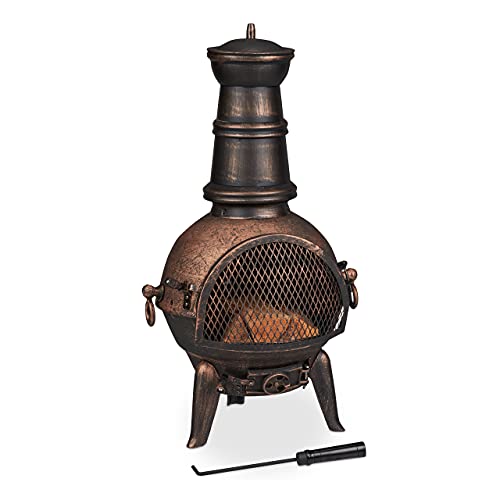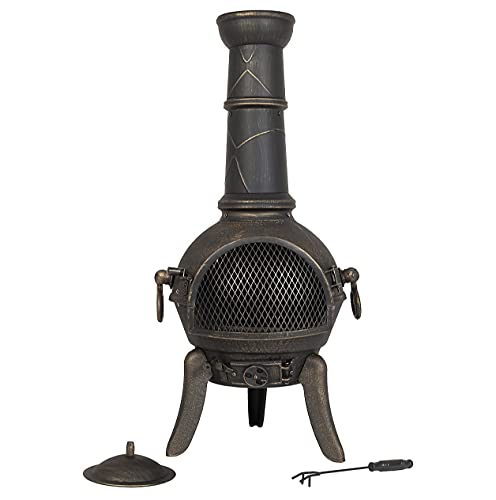It's The Complete Cheat Sheet For Chimineas And Fire Pits
Page Information

Content
 Choosing Between Chimineas and Fire Pits
Choosing Between Chimineas and Fire Pits Choosing between a fire pit or a chiminea will come down to your personal taste and the overall design of your garden. Chimineas are an elegant design that can complement rustic outdoor decor. Fire pits are, on the other hand, feature modern lines and can be incorporated with modern garden layouts.
Choosing between a fire pit or a chiminea will come down to your personal taste and the overall design of your garden. Chimineas are an elegant design that can complement rustic outdoor decor. Fire pits are, on the other hand, feature modern lines and can be incorporated with modern garden layouts.Safety is also a aspect when it comes to fire pits, which need to be placed away from flammable materials. Meanwhile, chimineas can be used for cooking and are safer in windy conditions because of their enclosed design.
Aesthetics
Chimineas in addition to fire pits can bring warmth to any outdoor space. However, deciding on the best one is dependent on your aesthetic preferences and spatial requirements. Fire pits are more flexible in design than chimineas, however they come with extra costs such as fuel and maintenance. Chimineas, on the contrary on the other hand, have more traditional appearance with controlled heat and smoke. Understanding the differences between these two options, and assessing your requirements are the initial steps to choosing the best American-made chiminea for sale.
Chimineas, also referred to as front-loading outdoor ovens, also known as fireplaces, are freestanding and have an air vent that is vertical. Chimineas are typically made of clay or terracotta, or cast iron. They are also available in metal, steel or cast iron. Clay chimineas can be decorative and traditional, but are fragile. Metal versions can withstand higher burning temperatures and tend to be more robust.
A chiminea's unique design will direct the smoke towards the sky and away from people who are seated around it, making it an ideal option for smaller spaces where controlling smoke is an issue. The open top makes them simpler to clean and they can be used with a grill to cook. They are also safer than fire pits since they don't produce the same amount of sparks.
Fire pits, on other hand are designed to allow the full combustion of wood. They can also be used with different fuel types. They are a popular option for backyard patios and can be placed close to seating areas. They can burn standard-size logs as well as small chiminea branches and twigs to create more controlled flames.
When deciding between a fireplace or a chiminea fire pit, the initial investment and ongoing costs are crucial to take into consideration. While a chiminea can cost more upfront but its durability and ease of use can lower the cost over time. On the other hand the fire pit may be cheaper but can require more frequent maintenance and replacement parts. Chimineas have a smaller environmental impact due to its controlled burn and produces less smoke.
The output of heat
The amount of heat generated by a largest chiminea is contingent on its size, the type of wood used, and the way it is placed in the fire. Dry, well-seasoned wood will produce more heat than damp or green wood. A chiminea that is in a favorable position, that is not shaded by trees or other structures, will also be able to absorb more heat than one that is. Chiminea chimneys can send more heat into the air, especially when the funnel design of the chiminea extra large is used.
While both provide warmth to the people sitting around them, their perception of warmth may differ significantly. The type of clothing being worn, the personal metabolism of each person, and other physiological factors all affect how warm a person feels. However, regardless of these variables, chimineas are still an ideal source of warmth for small groups or intimate gatherings.
Chimineas are distinguished by a wide base, and an open chimney which draws air into the unit to provide fuel. They can be constructed of clay, terracotta, cast iron or steel, with the metal models typically being able to withstand high temperatures and are less prone to rust. Chimineas made of clay and terracotta have an older-fashioned look however they can crack over time and need special care. Cast iron models are more robust and can be used for cooking food. They are also able to hold larger logs.
Apart from being a stunning design element, these units are also excellent to heat outdoor spaces and can be placed on the patio or in the backyard to create a relaxing ambience. Many homeowners pair with a chiminea and grill to increase their cooking capabilities.
Fire pits however, have a smaller opening inside the body which limits the size of logs that can be utilized. They are also more likely to create many sparks, which is why they should be stored in a safe area. A fire pit is the best choice for large outdoor spaces where lots of people can enjoy its warmth after the sun goes down.
Smoke control
Whether you want to add an instant rustic look to your garden or patio, a chiminea is a great way to create an inviting place to get together with family and friends. These decorative fireplaces, which were originally used for cooking and heating are available in a variety of materials. Traditional clay models and modern cast iron versions are available. They are best placed close to the ground. They also have an open flame design that draws in oxygen to ignite, while keeping the flames away from the people.
Chimineas radiate heat outwards from the front opening and warm those seated near it. However the chimney stack could be quite low, and consequently generate a lot of wood smoke, especially when burning wood that isn't fully well-seasoned. This can cause the build-up of carbon monoxide (CO), an odourless, colourless gas that can be fatal if breathed. This can be avoided by using hardwood that has been seasoned or alternative fuels like bioethanol.
Fire pits however are open on all sides which allows the heat they generate to be felt by people in a 360-degree radius. However, they can produce a significant amount of smoke based on wind direction and the size of the logs employed. Pick a model with a double-wall design to increase the airflow and reduce smoke emissions.
Both chimineas as well as fire pits require regular maintenance to function safely. Choose the best option based on your needs. Safety, maintenance and environmental impact are all factors to take into consideration. Select a chiminea that is in compliance with local laws and regulations on outdoor fires, and choose environmentally friendly fuel options to reduce environmental impact.
Chimineas are more secure than fire pits when it comes to safety as they contain and move the flame upwards. They are also more stable than fire pits since they stand on a stand rather than sitting directly on the ground but it is important to place them away from any flammable items such as fences and sheds. However, they do emit smoke and sparks which can erupt into seating areas, so use spark screens when seated close to them.
Maintenance
Chimineas, specifically clay models, require careful care due to their brittleness. They should be placed on a stable surface and it is crucial to keep children and pets away from the structure to avoid accidents. Chiminesas' bodies can be hot for a long time after it is ignited, so make sure to keep it away from any flammable objects or structures. Do not put it in the fire pit with water as this can cause the material to break or crack. It is best to use an outdoor fire pit made of durable metal, which can endure higher temperatures and is less likely to be damaged by rain or snow.
Both kinds of outdoor fire pits can create an elegant focal point for any backyard or patio. Chimineas are a better option for a rustic look fire pits can be used with various home and garden styles. Take into consideration your preferences for aesthetics as well as your maintenance capabilities and environmental considerations when deciding between the two alternatives.
Depending on the material, both chimineas and fire pits come in a range of sizes and styles to fit any space. Chimineas made of clay, for instance provide a genuine Mexican heritage while steel fire pits are more durable and simple to clean. Take into consideration the initial investment and long-term expenses of each model as well when choosing which one is best for you.
Chimineas produce less smoke and have fewer emissions. This helps reduce health risks and nuisances to neighbours. The type of fuel you choose is crucial. Wood that is seasoned is the best to reduce smoke.
Chimineas are also more comfortable to use when entertaining guests. Their enclosed design and chimney stack will direct the smoke upwards to prevent the inhalation. A fire pit is more open and therefore exposed to wind patterns. This increases the amount of smoke that is produced. Both are eco-friendly if you select the right fuel, however Chimineas are better able to reduce the environmental impact.
- PreviousIs Technology Making Cast Iron Chiminea Better Or Worse? 24.10.23
- NextHow To Outsmart Your Boss Chimineas And Fire Pits 24.10.23
Comment list
There are no registered comments.
